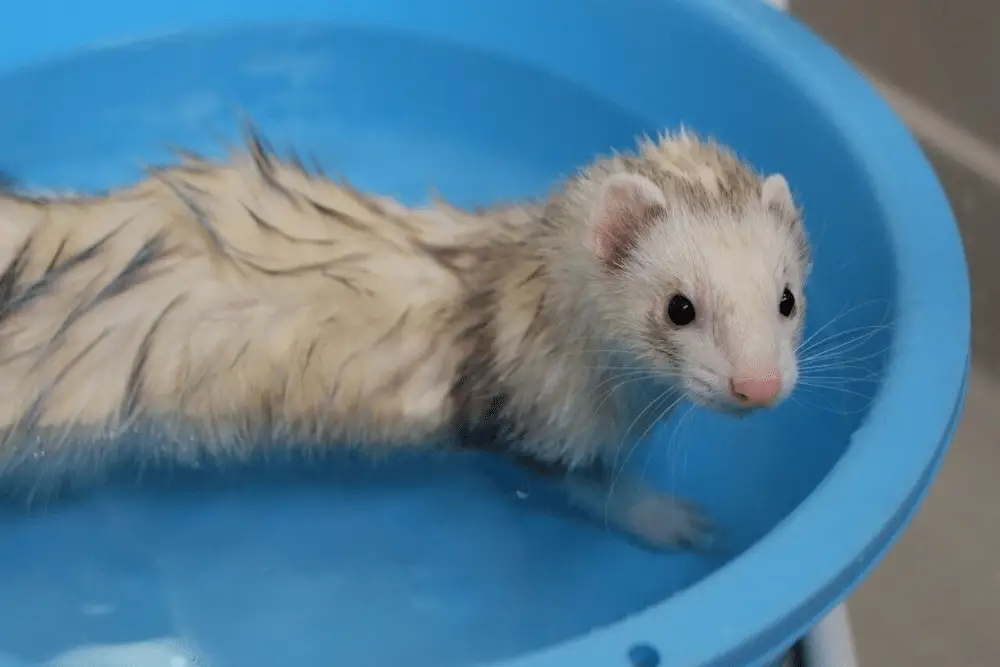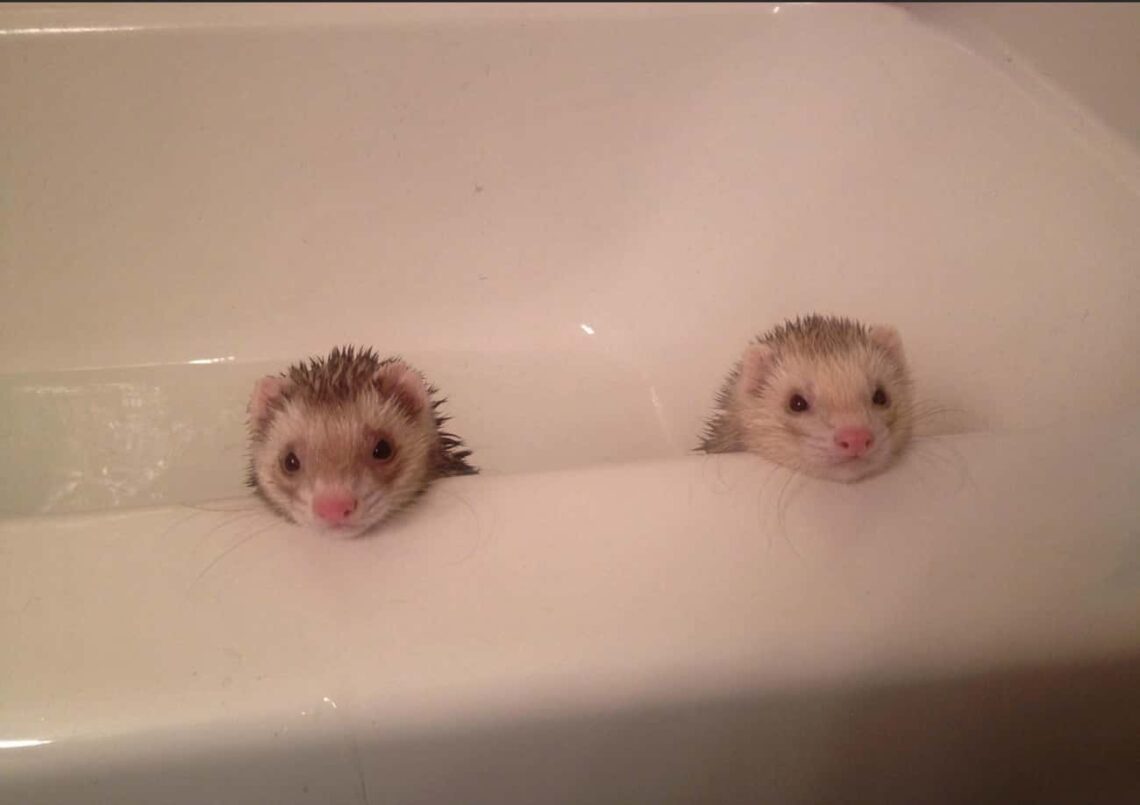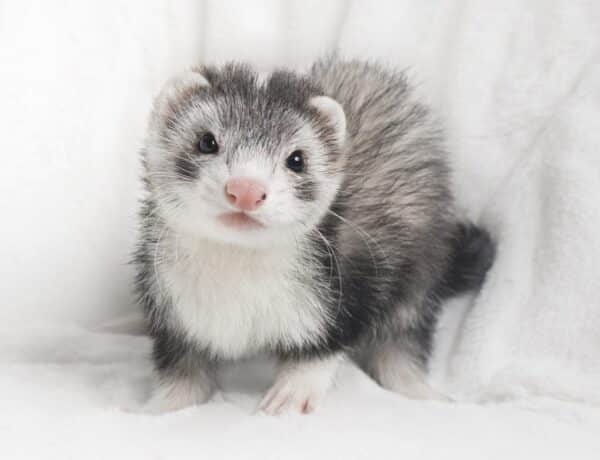Introduction
How To Bathe A Ferret: Bathing a ferret can be an amusing and rewarding experience, provided you approach it with the right knowledge and techniques. These small, curious, and often mischievous creatures require occasional baths to keep their coats clean and healthy, just like any other pet. However, ferrets have unique needs and characteristics that make their bathing routine a bit different from that of dogs or cats. In this guide, we will walk you through the essential steps and considerations on how to bathe a ferret safely and effectively. Whether you’re a new ferrets bite owner or looking to improve your ferret grooming skills, understanding the intricacies of ferret bathing is essential for the well-being of your furry friend. Ferrets, with their playful personalities and sleek, shiny coats, can make wonderful companions.
Yet, their active nature often leads them into various adventures that can leave them in need of a good bath. Maintaining their cleanliness is not only essential for their health but also for reducing any unpleasant odors that may arise from their musky scent glands. While bathing a ferret may seem like a daunting task, it can become a bonding experience between you and your pet when done correctly. In this comprehensive guide, we will delve into the step-by-step process of how to bathe a ferret, offering tips, precautions, and best practices to ensure that your ferret emerges from the bath looking and feeling its best. So, let’s embark on this journey of ferret grooming together, and discover the art of keeping your ferret fresh and happy.
Beyond the functional aspects of bathing, this guide will also touch on the importance of trust-building and patience, as ferrets can be sensitive creatures that may initially resist the idea of water. Learning how to approach bath time with gentleness and understanding is crucial for both your ferret’s well-being and your own peace of mind. Throughout this guide, we will provide insights into selecting the right bathing supplies, creating a safe and comfortable bathing environment, and the gentle techniques required to ensure your ferret’s bath is a stress-free experience. By the end of this journey, you’ll have the knowledge and confidence to care for your ferret’s hygiene needs, fostering a stronger bond with your beloved pet. So, let’s dive into the world of ferret bathing, where you’ll discover the secrets to keeping your furry friend clean and content.

Is it OK to bathe a ferret?
Keep the cage and litter clean and it will help keep your ferret smelling fresh. Bathing tends to dry out the skin and coat, at most bathe once a month. Unless your ferret has gotten into something that needs to be washed off, a bath every two to three months is probably plenty.
Ferrets have naturally oily skin, and over-bathing can strip away these essential oils, leading to skin dryness and irritation. In general, ferrets should only be bathed when they are truly dirty or have a strong odor. Most ferrets can go several months between baths without any issues.
When you do decide to bathe your ferret, it’s crucial to use a shampoo specifically formulated for ferrets. Regular pet shampoos or human shampoos can be too harsh and may irritate their sensitive skin. Ferret shampoos are designed to be gentle and safe for their unique needs.
Ensure the water temperature is comfortably warm, similar to what you’d use for a baby. Avoid hot water, as it can be uncomfortable and stressful for your ferret.
Create a safe and secure bathing environment. A shallow sink or basin with non-slip material on the bottom is ideal. Keep all the necessary supplies within reach to prevent leaving your ferret unattended.
What do you use to clean a ferret?
They usually do a pretty good job of cleaning themselves much like a cat. If you give them a bowl of water, they will use it to clean their face. Bathing is, however, good for relieving itchiness caused by fleas or dry skin. If you are going to bathe a ferret, make sure you use pet-friendly shampoo and warm bath water.
Look for pet-specific cleaning products or those labeled as safe for small animals. Avoid using harsh chemicals, bleach, or ammonia-based cleaners, as these can be harmful to ferrets. A mixture of water and white vinegar (in a 1:1 ratio) can be used as a safe and natural cleaning solution. It helps remove odors and disinfects the ferret’s cage and accessories.
Use these to scrub the ferret’s cage bars, floors, and platforms. A container for mixing cleaning solutions and rinsing items. These are handy for wiping down surfaces and drying the cage.
Choose a shampoo designed for ferrets to bathe them when necessary. Use it for regular grooming to remove loose fur and prevent matting. Essential for trimming your ferret’s nails to prevent overgrowth.
Ferret bedding and hammocks: Ferrets love cozy bedding, which should be washed regularly. Use a gentle, fragrance-free detergent, and rinse thoroughly to remove all soap residues.
What shampoo can I use on my ferret?
Marshall original ferret shampoo with baking soda is especially ph balanced for ferrets with the gentlest natural cleaning s. Helps control odor and enhances skin and coat. Gently cleans without stripping essential body oils.
The best choice for bathing your ferret is a shampoo specifically formulated for ferrets. These shampoos are designed to be gentle on their sensitive skin and coat. Look for ferret-specific shampoos at pet supply stores or online retailers.
If you cannot find a ferret-specific shampoo, opt for hypoallergenic and fragrance-free shampoos designed for sensitive skin. Baby shampoos, particularly those with mild and hypoallergenic formulas, can be a suitable alternative. Ensure they are free from harsh chemicals and fragrances that may irritate your ferret’s skin.
Do not use regular human or dog shampoos on your ferret. These shampoos often contain harsher chemicals that can be too abrasive for ferret skin and can lead to skin dryness and irritation.
Regardless of the shampoo you choose, dilute it with water according to the instructions on the bottle. Always use lukewarm water for the bath, and be gentle when applying the shampoo. Avoid getting shampoo near your ferret’s eyes, nose, and ears.
Can you use soap on a ferret?
Ferrets have very sensitive skin which means you can’t bathe them with your shampoo. You can’t bathe them with Dawn dish soap or any other dish soap or detergent. You wouldn’t use dish soap for your own bath, so don’t use it for any animal, including ferrets.
The safest and most suitable option for bathing a ferret is to use a shampoo specifically formulated for ferrets. These shampoos are designed to be gentle on their skin and coat, taking into account their unique needs.
If you cannot find a ferret-specific shampoo, you may opt for hypoallergenic and fragrance-free baby shampoos. These shampoos are typically milder than regular adult shampoos and can be a suitable alternative, but you should still exercise caution and ensure they are free from harsh chemicals.
Regardless of the shampoo you choose, it’s important to dilute it with water according to the instructions on the bottle. When applying shampoo, be gentle and avoid getting it near your ferret’s eyes, nose, and ears.
If you are unsure about which product to use or have concerns about your ferret’s skin, it’s always a good idea to consult with your veterinarian. They can provide guidance and recommend the most appropriate shampoo or cleaning solution for your ferret’s specific needs.
Do ferrets like cold baths?
Never use cold water to cool your ferret, the blood vessels will narrow and your ferret may overheat or even go into shock. Never underestimate overheating in ferrets. Some ferrets do not know their own limits and then you as an owner must decide how far they can go.
Lukewarm Water is Ideal: The ideal water temperature for ferret baths is lukewarm, which is similar to what you would use for a baby. Lukewarm water is comfortable for your ferret and reduces the risk of shocking them with water that is too hot or too cold.
Avoid Cold Water: Cold water can be uncomfortable and even stressful for ferrets. Remember that ferrets have a smaller body mass compared to humans, so they can feel temperature changes more intensely.
Individual Preferences: Just like people, ferrets have their own preferences. Some may be more tolerant of cooler water, while others may prefer it slightly warmer. It’s a good idea to monitor your ferret’s behavior during bath time to gauge their comfort level.
Observing Signs of Discomfort: Watch for signs that your ferret may not be comfortable with the water temperature. These signs can include shivering, attempts to escape, or vocalizations of distress. If you notice any of these signs, adjust the water temperature to be warmer.
Is ferret odor bad?
Ferrets have a natural, normal smell but that doesn’t mean they should stink. Ferrets are popular pets, but many people note that they have a distinct odor to them. This musky smell is something that most ferret owners get used to and eventually don’t even notice, but sometimes the stink is worse than it should be.
Ferrets have natural scent glands located near their anus. These glands secrete a musky odor, which is a natural part of their communication and social behavior. In the wild, this scent helps ferrets identify each other and communicate with other members of their group.
Regular bathing can help reduce the intensity of the natural musky odor. However, it’s important not to over-bathe your ferret, as excessive bathing can strip away their natural oils, leading to dry skin and potentially more intense odor as their body compensates by producing more oils.
Diet plays a significant role in ferret odor. A poor diet can lead to stronger-smelling waste and potentially more intense body odor. Feeding your ferret a high-quality, protein-rich diet formulated specifically for ferrets can help manage odor.
Spaying or neutering your ferret can significantly reduce musky odor. Intact males and females tend to have a stronger odor, especially during mating season. Spaying or neutering helps regulate hormone production and, consequently, the intensity of the scent glands’ secretions.
Can I use baby shampoo on my ferret?
When bathing your pet, use shampoos made specifically for ferrets. You can also use baby shampoo. Add a few inches of warm water to a sink or container, then gently lather the little guy up. Rinse your pet thoroughly.
Avoid Adult or Scented Shampoos: It’s crucial to avoid using regular adult or scented shampoos on your ferret. These shampoos can contain harsh chemicals or fragrances that may be too strong for a ferret’s sensitive skin and could lead to skin issues.
Regardless of the shampoo you choose, it’s essential to dilute it with water according to the instructions on the bottle. Always use lukewarm water for the bath and be gentle when applying the shampoo. Take care to avoid getting shampoo near your ferret’s eyes, nose, and ears.
During the bath, closely observe your ferret’s behavior. If you notice signs of discomfort or skin irritation, such as excessive scratching, redness, or dryness, stop the bath immediately and rinse your ferret thoroughly.
Once the bath is complete, gently towel-dry your ferret to remove excess moisture. Ensure they are completely dry before returning them to their living space, as damp fur can lead to health issues.
Can I put Vaseline on my ferrets skin?
Apply a barrier cream to the inside of the ferret’s back legs (such as Vaseline or Sudocrem). This will help to ensure that any urine in contact with the skin doesn’t create scalding of the skin. Cleaning any urine or feces off the ferret and ensuring they are dried properly will also help to prevent urine scalding.
Using Vaseline or petroleum jelly on your ferret’s skin is generally not recommended unless specifically advised by a veterinarian for a particular medical reason. While Vaseline is a common household product known for its moisturizing properties, it may not be suitable for ferret skin care for several reasons:
If you believe your ferret has a specific skin issue or condition that requires treatment or moisturization, it’s crucial to consult with a veterinarian who specializes in ferret care. A veterinarian can provide appropriate guidance and recommend products or treatments that are safe and effective for your ferret’s specific needs.
In general, maintaining proper ferret hygiene and ensuring a clean living environment, a balanced diet, and regular grooming should help prevent many common skin issues. If you notice any changes in your ferret’s skin or coat, such as dryness, redness, hair loss, or signs of discomfort, seek professional veterinary advice before attempting any home remedies or treatments.

Conclusion
Bathing a ferret may seem like a daunting task at first, but with the right approach and knowledge, it can become a rewarding experience for both you and your furry friend. We’ve explored the ins and outs of ferret bathing in this guide, from selecting the appropriate supplies to creating a safe and comfortable environment, and employing gentle techniques to ensure your ferret’s well-being. Remember that every ferret has its unique personality and preferences, so patience and understanding are key. Building trust and forming a positive association with bath time can go a long way in making the process smoother and more enjoyable for both you and your pet. By following the steps and tips outlined in this guide, you’ll not only keep your ferret clean and healthy but also strengthen the bond you share with your beloved companion.
With practice, you’ll become a confident and skilled ferret groomer, ensuring that your ferret emerges from each bath looking and feeling its best. So, embrace the art of ferrets bath and provide your playful, curious friend with the care and attention they deserve. In the world of ferret care, bathing is just one of the many aspects of responsible pet ownership. By learning how to bathe a ferret effectively and with care, you’re demonstrating your commitment to providing a happy and healthy life for your beloved companion. As you embark on your ferret’s grooming journey, remember that each experience is an opportunity to strengthen your bond, foster trust, and ensure your ferret’s overall well-being.
Whether you’re a first-time ferret owner or an experienced enthusiast, the knowledge and techniques shared in this guide will serve as valuable tools in maintaining your ferret’s hygiene and happiness. So, embrace the challenges and rewards of ferret bathing, and cherish the special moments you share with your furry friend. With dedication and understanding, you’ll not only keep your ferret looking its best but also nurture a loving and enduring relationship that will last a lifetime. In the world of ferret care, bathing is just one facet of the multifaceted journey of being a responsible pet owner. Through the process of learning how to bathe a ferret effectively and gently, you are not only ensuring the cleanliness and health of your pet but also deepening the connection you share.





No Comments